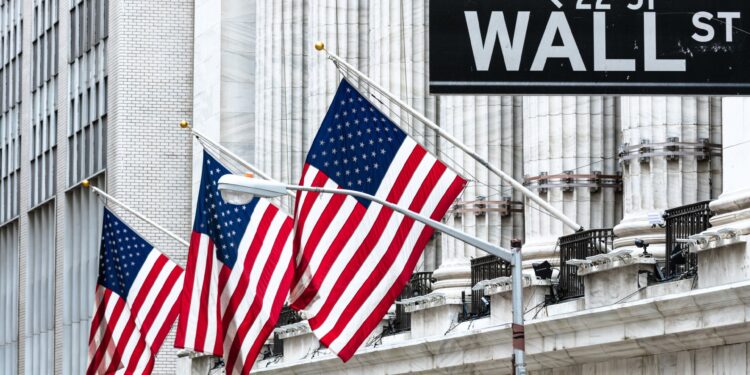Wall Street capped off another busy week on Friday, as the Standard & Poor’s 500 (S&P 500) and Nasdaq hit new records, driven by the continued rise of AI stocks.
According to the Associated Press, the Standard & Poor’s 500 index rose 0.8%, closing at 5 million and 137 thousand and 8 points, after its great march of 16 gains in the past 18 weeks. The Dow Jones Industrial Average rose 0.2% to 39,87,038 points, while the Nasdaq Composite Index rose 1.1% to 16,274,094 points, exceeding the record for 2021.
Analysts who spoke to Reuters attribute this upward trend to the contribution of Dell Technologies, as it announced a noticeable jump of 31.6% in its shares after exceeding analysts’ expectations for profits and revenues in the last quarter. The strong demand for AI-optimized servers has been confirmed, indicating the ongoing boom in the sector. NetApp also saw a jump of 18.2% after better-than-expected results, confirming the continued momentum in the field of artificial intelligence.
However, the banking industry faced a contradictory scenario, marked by a 25.9% decline in New York Community Bancorp stock. The bank’s alarming revelation of “material weaknesses” in internal controls related to loan reviews, coupled with the immediate departure of its CEO, has unnerved investors, according to the Associated Press. The issues at New York Mercantile Bank have raised concerns about the broader challenges facing banks, particularly in the wake of last year’s industry crisis and the collapse of several regional banks.
While the Federal Reserve is considering making adjustments to interest rates, hopes for lowering interest rates were strengthened last June by reports that showed a contraction in the US manufacturing industry last February for the 16th month in a row. Despite signs of economic strength, a separate report from the University of Michigan revealed weaker-than-expected sentiment among American consumers. While the bond market responded with a decrease in Treasury bond yields, which indicates increasing expectations for the next interest rate cut.
In light of these developments, Reuters notes that concerns remain about the potential impact on regional banks such as New York Commercial Bank, which faces increased scrutiny and challenges from loans linked to real estate projects. While the AI sector continues to push stock markets to record highs, the delicate balance between economic resilience, inflation and interest rate policies remains a focal point for investors.
Disturbances at the New York Commercial Bank
Amid broader market activity, New York Commercial Bank’s problems deepened when it replaced its CEO, sending its shares down nearly 26%. According to Reuters, the bank reported a fourth-quarter loss more than 10 times larger than initially reported. The revelation of “material weaknesses” in internal controls exacerbated concerns, sending New York Mercantile Bank shares down 65% during the year.
The bank’s market value suffered a major hit, falling by about $900 million on Friday alone, adding nearly $5 billion to total losses since January 31. Speaking to Reuters, Keith Horowitz, a Citigroup analyst, stressed the seriousness of the situation, noting that major changes are necessary in how the New York Central Bank monitors credit risks to restore investor confidence.
The New York Commercial Bank assured investors that the weaknesses revealed will not affect its financial results for the fiscal year 2023, and it plans to outline a remediation plan in its next annual report. While Fitch Ratings Agency downgraded the bank’s rating, in addition to its subsidiary Flagstar Bank, reflecting growing doubts from various rating agencies.
In response to this disruption, the New York Commercial Bank announced a series of executive changes. The new CEO, Alessandro Dinello, expressed his confidence in implementing the transformation plan to achieve increased shareholder value. Despite these efforts, market analysts remain cautious, stressing the challenges faced by the New York Central Bank in restoring transparency and investor confidence, according to what Reuters monitored.
Market expectations and investor caution
While the AI sector is pushing the stock market to new heights, concerns surrounding inflation, interest rates and the health of regional banks remain. Economists at Deutsche Bank expect a one percentage point cut in the Federal Reserve’s key interest rate in 2024, likely starting next June. However, chief US economist Matthew Luzetti warns against excessive optimism, noting that stock prices have already risen, and Treasury yields have fallen in anticipation of interest rate cuts.
The challenges faced by New York Commercial Bank have sparked a broader debate about the health of regional banks, although JPMorgan analysts believe New York Commercial Bank’s situation is specific and does not indicate broader pressures on regional banks.
In this dynamic landscape, Wall Street remains prepared for continued volatility, as the intersection of economic data, interest rate decisions, and corporate performance shapes the course of the market in the coming weeks. As investors weigh the prospects for AI-driven growth against the headwinds facing regional banks, the market’s resilience in the face of evolving economic dynamics will be tested.



